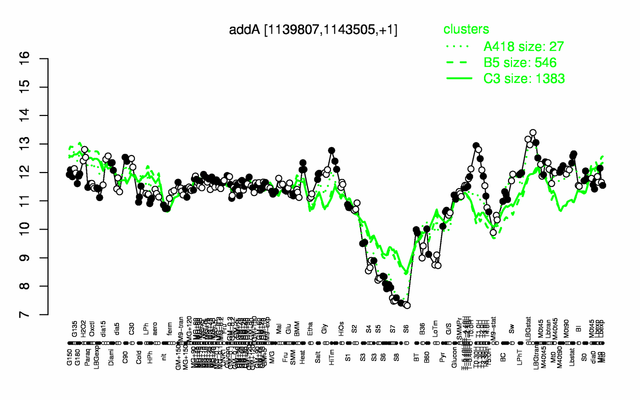AddA
- Description: ATP-dependent deoxyribonuclease (subunit A), required for efficient survival and replication restart after replication-transcription conflicts
| Gene name | addA |
| Synonyms | recE5 |
| Essential | no |
| Product | ATP-dependent deoxyribonuclease (subunit A)) |
| Function | DNA repair/ recombination |
| Gene expression levels in SubtiExpress: addA | |
| Interactions involving this protein in SubtInteract: AddA | |
| MW, pI | 140 kDa, 5.127 |
| Gene length, protein length | 3696 bp, 1232 aa |
| Immediate neighbours | addB, sbcD |
| Sequences | Protein DNA DNA_with_flanks |
Genetic context 
This image was kindly provided by SubtiList
| |
Expression at a glance PubMed
| |
Contents
Categories containing this gene/protein
DNA repair/ recombination, genetic competence
This gene is a member of the following regulons
The gene
Basic information
- Locus tag: BSU10630
Phenotypes of a mutant
Database entries
- BsubCyc: BSU10630
- DBTBS entry: [1]
- SubtiList entry: [2]
Additional information
- A mutation was found in this gene after evolution under relaxed selection for sporulation PubMed
The protein
Basic information/ Evolution
- Catalyzed reaction/ biological activity:
- the enzyme is functional as a heterodimer of the AddA and AddB subunits, that it is a rapid and processive DNA helicase, and that it catalyses DNA unwinding using one single-stranded DNA motor of 3'→5' polarity located in the AddA subunit PubMed
- the AddB subunit contains a second putative ATP-binding pocket, but this does not contribute to the observed helicase activity and may instead be involved in the recognition of recombination hotspot sequences PubMed
- Protein family: uvrD-like helicase C-terminal domain (according to Swiss-Prot)
- Paralogous protein(s):
Extended information on the protein
- Kinetic information:
- Domains:
- Modification:
- Cofactor(s):
- Effectors of protein activity:
Database entries
- BsubCyc: BSU10630
- UniProt: P23478
- KEGG entry: [3]
- E.C. number:
Additional information
Expression and regulation
- Regulatory mechanism:
- Additional information:
- number of protein molecules per cell (minimal medium with glucose and ammonium): 147 PubMed
Biological materials
- Mutant: GP1106 (addA-addB, spc), available in Jörg Stülke's lab
- Expression vector:
- lacZ fusion:
- GFP fusion:
- two-hybrid system:
- Antibody:
Labs working on this gene/protein
- Mark Dillingham, Bristol, U.K. (homepage)
Your additional remarks
References
Reviews
Original publications